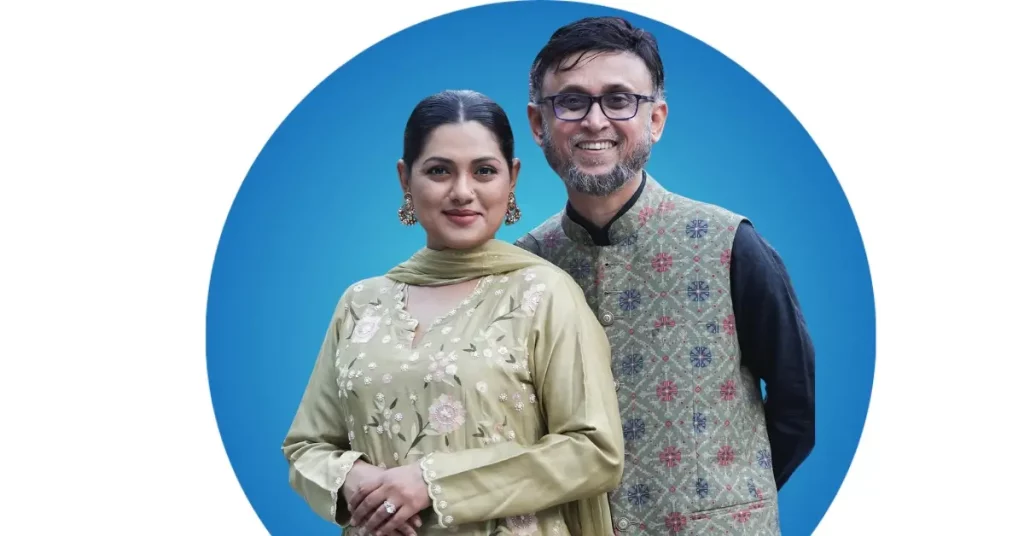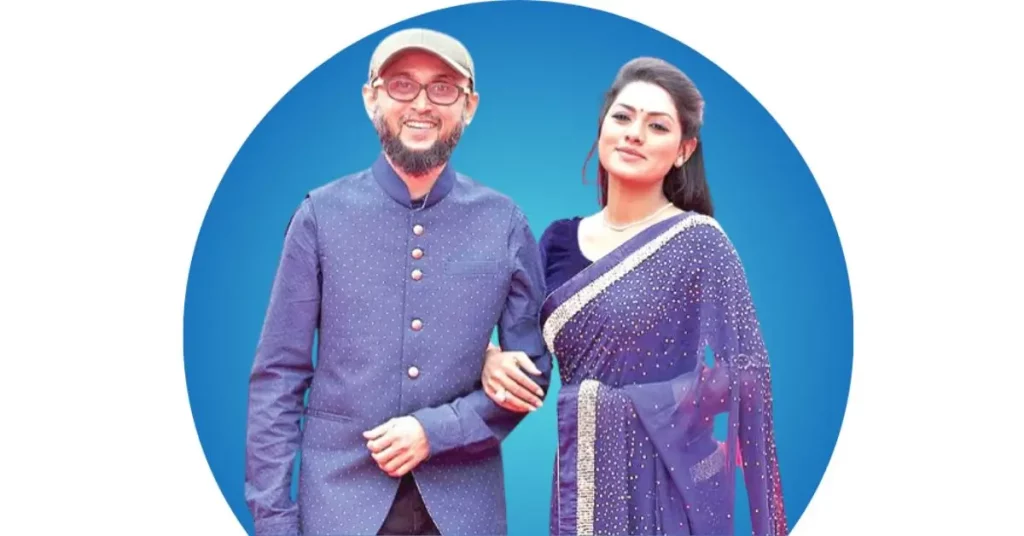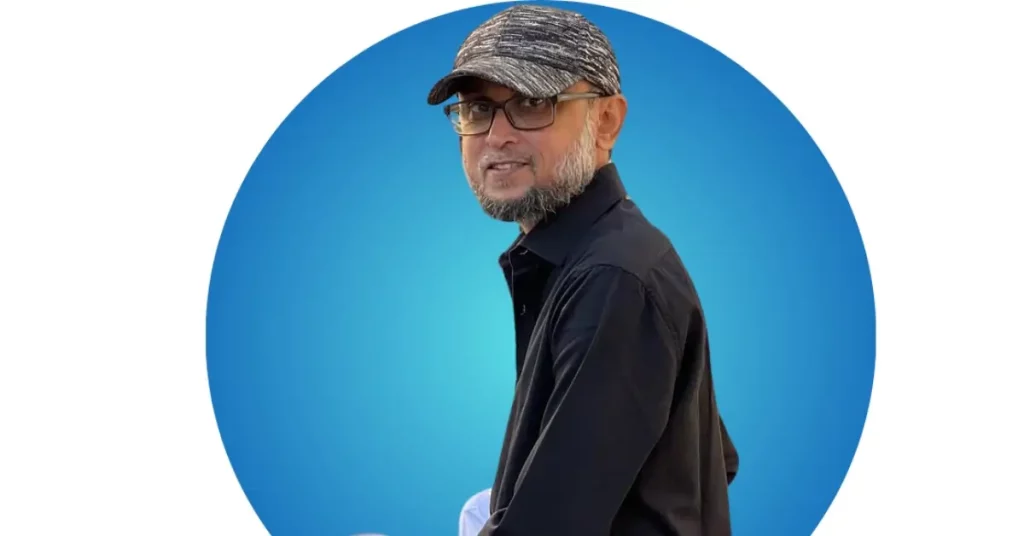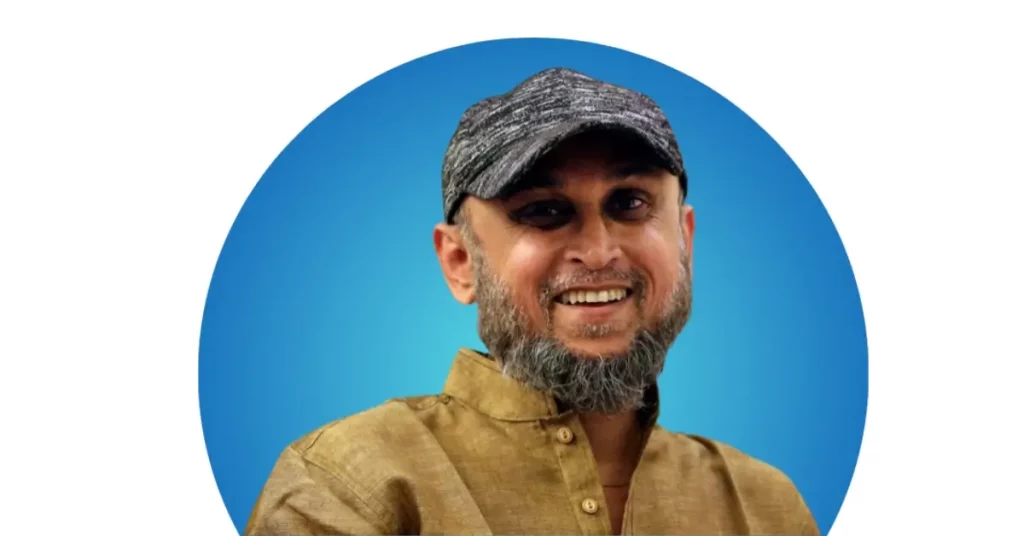Mostofa Sarwar Farooki Biography, Age, Wife, Movie, Natok & More

Mostofa Sarwar Farooki is a well-known Bangladeshi film director, screenwriter, and producer who was born on May 2, 1973. He is acknowledged for his role in bridging the gap between reality and escape through modernism and realism in Bangladeshi film.
Mostofa Sarwar Farooki Personal Details:
| Full Name | Mostofa Sarwar Farooki |
|---|---|
| Nickname | Farooki |
| Birth Date | May 2, 1973 |
| Birth Place | Nakhalpara, Dhaka, Bangladesh |
| Age | 50 |
| Religion | Islam |
| Zodiac Sign | Taurus |
| Occupation | Filmmaker, Producer, Screenwriter |
| Active Years | 1999 – Present |
| Nationality | Bangladeshi |
| Residence | Dhaka, Bangladesh |
Mostofa Sarwar Farooki Physical Stats:
| Physical Stats | |
|---|---|
| Height | 168 cm (5’6″) |
| Weight | 70 kg (154 lbs) |
| Eye Color | Black |
| Hair Color | Black |
Mostofa Sarwar Farooki Education:
| Education | |
|---|---|
| School | Tejgaon Government Boys’ High School |
| College/University | Not Attended |
| Degree/Diploma | Not Available |
Mostofa Sarwar Farooki did not pursue higher education at a university, and his learning is attributed to his experiences in the multicultural community he grew up in.
Mostofa Sarwar Farooki Family Details:
| Category | Details |
|---|---|
| Marital Status | Married |
| Spouse | Nusrat Imrose Tisha (married in 2010) |
| Children | Ilham Nusrat Farooki (born in 2022) |
Mostofa Sarwar Farooki Social Media Profile:
| Platform | Profile Handle |
|---|---|
| Mostofa Sarwar Farooki | |
| @FarookiSarwar | |
| @farooki_mostofa | |
| Mostofa Sarwar Farooki | |
| Wikipedia | MostofaSarwarFarooki |
| IMDb | Mostofa Sarwar Farooki |
Mostofa Sarwar Farooki Favourite Things:
| Category | Favorite Thing |
|---|---|
| Favorite Actor | Irrfan Khan |
| Favorite Film | “Television” |
| Favorite Food | Bangladeshi Cuisine |
| Hobbies | Filmmaking, Storytelling, Exploring Cultures |
Mostofa Sarwar Farooki Net Worth:
| Category | Amount |
|---|---|
| Net Worth | $1 million – $7 million |
Infancy and Schooling:
Raised in a middle-class household in Nakhalpara, Dhaka, Farooki did not go to college. His foundation in schooling came from his close-knit, multicultural childhood. Even though watching movies was frowned upon when he was younger, he became passionate with storytelling by studying people’s lives.
Profession:

“Bachelor” served as Farooki’s directorial debut in 2004, and “Mad_e in Bangladesh” followed in 2007. Themes like urban young romance, middle-class anguish, and human weakness are frequently explored in his works. “Television” in particular brought Farooki recognition on a global scale in 2012, which took home multiple honors and was screened as the Busan festival’s closing picture.
Mostofa Sarwar Farooki’s Directorial Contributions to Various Projects:
| Project Title | Release Year | Role |
|---|---|---|
| Something Like an Autobiography | 2023 | Director |
| No Land’s Man | 2021 | Director |
| Ladies & Gentlemen | 2021 | Director |
| Saturday Afternoon | 2019 | Director |
| Ayesha | 2018 | Director |
| Doob – No Bed of Roses | 2017 | Director |
| Piprabidya | 2013 | Director |
| Television | 2012 | Director |
| First Date | 2009 | Director |
| Emon Deshti Kothao Khuje Pabe Nako Tumi | 2009 | Main Director |
| Third Person Singular Number | 2009 | Director |
| Carrom 2nd Paper | 2008 | Main Director |
| 420 | 2007 | Director |
| Hae/Na | 2007 | Main Director |
| Khesarot | 2007 | Director |
| Mad_e in Bangladesh | 2007 | Director |
| Nikhoj Shongbad | 2006 | Main Director |
| Un-Manush | 2006 | Main Director |
| Carrom | 2006 | Main Director |
| Talpatar Shepai | 2005 | Main Director |
| Spartacus ’71 | 2005 | Main Director |
| Urojahaj: A journey by plane | 2005 | Presented by |
| Murir Tin | 2005 | Presented by |
| Waiting Room | 2004 | Director |
| Bachelor | 2004 | Director |
| Choruivati | 2002 | Director |
| Vocatta | 1999 | Director |
Intimate Life:

Since July 16, 2010, he and Nusrat Imrose Tisha have been wed.
Inputs:
Farooki is a pivotal character in the new wave of Bangladeshi cinema, which tackles social concerns and reflects shifting viewpoints. His videos illustrate the duality of existence by alternating between the real and quasi-real worlds frequently.
Mostofa Sarwar Farooki’s Involvement as a Producer in Various Projects:
| Project Title | Release Year | Role |
|---|---|---|
| Opodartho | Pre-production | Producer |
| Something Like an Autobiography | 2023 | Co-producer |
| No Land’s Man | 2021 | Producer (Produced by) |
| Saturday Afternoon | 2019 | Producer |
| The Original Artist | 2018 | Producer |
| Jalaler Golpo | 2014 | Associate Producer |
| Piprabidya | 2013 | Producer |
| Television | 2012 | Executive Producer |
| Bouchi: Tom & Jerry | 2006 | Supervising Producer |
| Loss Project | 2006 | Producer |
| Kobutor | 2005 | Supervising Producer |
| Khosru + Moyna | 2005 | Supervising Producer |
| Tiner Tolowar | 2005 | Producer |
The Mostofa Sarwar Farooki’s Cinematic Style:
- 1. Examining Themes:Deep themes like middle-class anxiety, urban youth romance, deception-hypocrisy, and human weakness are central to Farooki’s cinematic style. His writings examine traditional Muslim notions of guilt and atonement as well as the intricacies of dissatisfaction resulting from cultural limitations.
- Holistic Approach:Farooki is credited with introducing modernism and realism to Bangladeshi cinema, and his works demonstrate a dedication to capturing the hardships and ambitions of common people. He has an acute sense of realism while capturing the subtleties of social relations.
- Identity Exploration:His corpus of work frequently examines how people overcome the constraints placed on them by their identity, social status, and religious convictions. This investigation adds depth layers to to his characters, giving them a human touch and a reflection of issues seen in daily life.
- Magical Realism: Farooki uses magical realism in his films to contrast the deprivation that his characters experience in real life. His narrative gains a surreal quality from this artistic decision, enabling the blending of fact and fantasy.
- Imaginary World Creation: Characters building imaginary worlds around them as a coping strategy is a recurrent theme in Farooki’s films. This narrative device emphasizes the inventive ways people interact with their surroundings, which helps to establish his trademark style.
- Acknowledgment and Praise:International acclaim has been bestowed upon Farooki’s cinematic aesthetic. In their review of “Television,” The Hollywood Reporter speculated that Mostofa Sarwar Farooki would be the next Southeast Asian director to manifest. He was cited by Variety’s Jay Weissberg as a pivotal figurehead for the Bangladeshi new wave film movement.
- Cultural Analysis: Farooki’s films function as a kind of cultural commentary, illuminating social mores, obstacles, and the human condition in Bangladesh. His narratives frequently include layers of social and cultural commentary.
To sum up, the cinematic style of Mostofa Sarwar Farooki is distinguished by an in-depth examination of societal themes, a dedication to social realism, and a distinct fusion of magical realism. In addition to being enjoyable, his films act as a mirror, highlighting the complexity of human existence and the difficulties people encounter in pursuing their own sense of independence and identity.
Controversy:

Sarwar Mostofa Farooki has encountered controversy throughout his career. The Ministry of Information of Bangladesh banned the movie “Doob – No Bed of Roses” after it encountered difficulties. The role of Irrfan Khan’s character Javed Hasan is purportedly modeled on the late playwright and director Humayun Ahmed, while Farooki disputes that it is a biography. The prohibition, which was imposed because it was seen to resemble actual occurrences, sparked debates over censorship and the right to free artistic expression.
His film “Television,” which challenges religious sensitivities by portraying an elderly village patriarch who finds happiness in watching a live webcast from Mecca, is likewise the subject of controversy despite critical acclaim. In Bangladeshi cinema, Mostofa Sarwar Farooki is regarded as a trendsetter for his innovative style of filmmaking.
Identification:
Reviews of Farooki’s art have been published worldwide, including those from Variety and The Hollywood Reporter. He is also renowned for spearheading the “Chabial” movement of avant-garde filmmakers.
Thoughts and Perspectives:
The idea that people exist in two worlds simultaneously—the physical and the mental—is reflected in Farooki’s films. He highlights how crucial it is for filmmakers to share their experiences in distinctive ways so that they can further the development of of movies from Bangladesh.
Ongoing Initiatives:
With a trilogy in the works and upcoming films like “Opodartho” in pre-production, Farooki is expected to make a substantial impact on the cinema industry going forward.
Mostofa Sarwar Farooki Health Concern:

- Incident (2024): On Monday night, Mostofa Sarwar Farooki, the well-known Bangladeshi director, felt ill. This led to a health catastrophe.
- Hospitalization: Nusrat Imrose Tisha, the actress, reported on Facebook that her husband had experienced a slight stroke. Farooki was brought to a private medical facility on Panthapath in Dhaka to receive treatment.
- Condition: Farooki is currently in the Neuro ICU following a medical evaluation. Doctors are closely monitoring him.
- Out of Danger: It has been announced that Farooki is no longer in danger despite the health scare. He is being closely observed and is getting medical attention.
- Prayer Request: Tisha has asked supporters and well-wishers to remember Mostofa Sarwar Farooki in their thoughts and prayers at this trying time.
Some Obscure Details Regarding Mostofa Sarwar Farooki:

- Upbringing in Multiple Cultures: Farooki grew up in the tight-knit Nakhalpara neighborhood of Dhaka, Bangladesh. He never attended college and credits his upbringing in a multicultural neighborhood with his education.
- Prohibited Area: When Farooki was younger, movies were seen as taboo. Although his father called the television a “shaitaaner baksho” (the devil’s box), he grew to love studying about human lives in textbooks.
- Initial Instructional Attempts: Farooki viewed his first two movies, “Bachelor” (2004) and “Mad_e in Bangladesh” (2007), as instructional endeavors. His early attempts to add to Bangladeshi cinema’s developing terrain are reflected in these films.
- Film Premieres: In 2009, Farooki’s film “Third Person Singular Number” made its European premiere at the International Film Festival Rotterdam after making its debut at the Busan International Film Festival.
- Avant-Garde Movement: The “Chabial” movement of avant-garde filmmakers was founded by Mostofa Sarwar Farooki. The goal of this movement has been to approach filmmaking from a new and creative angle.
- Recognition: Farooki’s 2012 film “Television” was the Busan Festival’s closing picture and was the recipient of other international honors, including the Grand Jury Prize at the Asia Pacific Screen Award in 2013.
- Concerns About Censorship: His movie “Doob – No Bed of Roses” ran into problems in Bangladesh with the censors. Irrfan Khan’s character, the movie’s protagonist, was purportedly modeled after the late author Filmmaker filmmaker Humayun Ahmed, sparking debate and the Ministry of Information of Bangladesh’s ban.
- Collaboration with Irrfan Khan: Actor Irrfan Khan and Farooki worked together on “Doob – No Bed of Roses.” He complimented Khan’s performance, emphasizing how the actor’s natural style and curiosity helped the movie succeed.
- Themes Exploration: In her corpus of work, Farooki addresses topics including urban young romance, middle-class anguish, dishonesty and hypocrisy, and human weakness. His videos frequently capture people’s unhappiness with cultural limitations and traditional Muslim notions of atonement and shame.
- Intriguing Human Mind Case: Regarding his source of inspiration, Farooki responded, “The curious case of human minds.” This implies that he was inspired by the subtleties and complexity of human cognition and conduct.
These little-known details shed light on Mostofa Sarwar Farooki’s upbringing, early professional life, and difficulties in the Bangladeshi film business.
In Summary:
In Bangladeshi cinema, Mostofa Sarwar Farooki is revered as a trailblazer for his innovative subject explorations and distinct cinematic style. His socially realistic and magically realistic films have been met with praise and criticism. His worldwide accolades, including the Asia Pacific Screen Awards, establishes him as a pivotal role in the Bangladeshi new wave film movement.
If you don’t like this post, you can check out Nusrat Imroz Tisha’s Biography.





